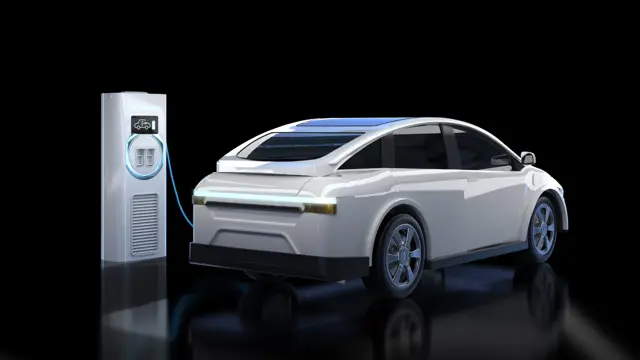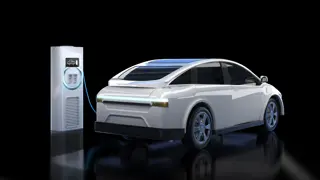
Electric Vehicles Specialization
Self-paced videos, Lifetime access, Study material, Certification prep, Technical support, Course Completion Certificate
Uplatz
Summary
- Reed courses certificate of completion - Free
- Uplatz Certificate of Completion - Free
Add to basket or enquire
Overview
Uplatz provides this comprehensive course on Electric Vehicles Specialization. It is a self-paced course with recorded video lectures. You will be awarded Course Completion Certificate at the end of the course.
Electric vehicles (EVs) are vehicles powered by one or more electric motors, using energy stored in rechargeable batteries or fuel cells. Unlike traditional internal combustion engine vehicles that rely on gasoline or diesel, electric vehicles run entirely or partially on electricity, resulting in reduced greenhouse gas emissions and dependence on fossil fuels.
Types of electric vehicles include:
Battery Electric Vehicles (BEVs): These vehicles are powered solely by electricity stored in rechargeable batteries. They produce zero tailpipe emissions and must be plugged into an external power source to recharge.
Plug-in Hybrid Electric Vehicles (PHEVs): PHEVs combine an electric motor with an internal combustion engine and a battery. They can be charged by plugging into an external power source and also have the option to run on gasoline or diesel when the battery is depleted.
Hybrid Electric Vehicles (HEVs): HEVs use both an internal combustion engine and an electric motor to propel the vehicle. Unlike PHEVs, they cannot be plugged in to recharge the battery; instead, the battery is charged through regenerative braking and the internal combustion engine.
Fuel Cell Electric Vehicles (FCEVs): FCEVs use hydrogen fuel cells to generate electricity, which powers the electric motor. They emit only water vapor as a byproduct and have longer ranges compared to battery electric vehicles.
A career in electric vehicles is quite promising and spans various domains:
Engineering: There's a high demand for engineers specializing in electric vehicle technology, including battery technology, electric motor design, power electronics, and vehicle integration. Roles may include electrical engineers, mechanical engineers, battery engineers, and systems engineers.
Research and Development: With ongoing advancements in electric vehicle technology, there are ample opportunities for researchers and scientists to contribute to the development of more efficient batteries, improved electric drivetrains, and enhanced charging infrastructure.
Manufacturing and Production: As the production of electric vehicles ramps up, there's a need for skilled professionals in manufacturing plants, including production managers, quality control engineers, assembly line workers, and logistics specialists.
Supply Chain Management: Managing the supply chain for electric vehicle components, such as batteries, motors, and electronic components, requires expertise in procurement, logistics, and inventory management.
Sales and Marketing: As the market for electric vehicles grows, there's a need for sales professionals, marketing managers, and customer service representatives with knowledge of electric vehicle technology and the ability to educate and attract consumers.
Infrastructure Development: The expansion of electric vehicle infrastructure, including charging stations and grid integration, creates opportunities for professionals in urban planning, civil engineering, and energy management.
Policy and Regulation: Governments around the world are implementing policies and regulations to promote electric vehicle adoption. Careers in this area include policymakers, environmental analysts, and sustainability consultants.
Maintenance and Service: Electric vehicles require specialized maintenance and repair services, creating opportunities for automotive technicians, electricians, and service advisors with training in electric vehicle technology.
The electric vehicle industry offers a wide range of career opportunities across various sectors, from engineering and manufacturing to sales, marketing, and policy development. As the transition to electric mobility accelerates, the demand for skilled professionals in this field is expected to continue growing.
Curriculum
Course media
Description
Electric Vehicles Specialization - Course Syllabus
- The Science of Electric Vehicles - I
- The Science of Electric Vehicles - II
- The Science of Electric Vehicles - III
- The Science of Electric Vehicles - IV
- The Science of Electric Vehicles - V
- The Science of Electric Vehicles - VI
- The Science of Electric Vehicles - VII
- The Science of Electric Vehicles - VIII
- The Science of Electric Vehicles - IX
- The Science of Electric Vehicles - X
- The Science of Electric Vehicles - XI
- Electric Vehicle Engineering - I
- Electric Vehicle Engineering - II
- Electric Vehicle Engineering - III
- Electric Vehicle Engineering - IV
- Electric Vehicle Engineering - V
- Electric Vehicle Engineering - VI
- Electric Vehicle Engineering - VII
- Electric Vehicle Engineering - VIII
- Electric Vehicle Engineering - IX
- Electric Vehicle Technology - I
- Electric Vehicle Technology - II
- Electric Vehicle Technology - III
- Electric Vehicle Technology - IV
- Electric Vehicle Technology - V
- Electric Vehicle Technology - VI
- Electric Vehicle Technology - VII
- Electric Vehicle Technology - VIII
- Electric Vehicle Technology - IX
- Electric Vehicle Technology - X
- Electric Vehicle Technology - XI
- Electric Vehicle Technology - XII
- Electric Vehicle Technology - XIII
- Electric Vehicle Technology - XIV
- Electric Vehicle Technology - XV
- Electric Vehicle Technology - XVI
- Electric Vehicle Technology - XVII
- Electric and Hybrid Buses - I
- Electric and Hybrid Buses - II
- Electric and Hybrid Buses - III
- Electric and Hybrid Buses - IV
- Electric and Hybrid Buses - V
Who is this course for?
Everyone
Requirements
Passion & determination to succeed!
Career path
- Electrical Vehicle Research Engineer
- Electrical & Electronics Engineer
- Battery Test Engineer (Electric Vehicles)
- Automotive Engineer
- Embedded Engineer
- Electric Vehicles Application Engineer
- Electric Vehicles Infrastructure Officer
- EV/Automotive Electrical Technician
- EV Systems Integration Engineer
- Account Manager EV
- Project Manager - EV Chargepoints
- Business Development Manager - Electric Vehicles
Questions and answers
Currently there are no Q&As for this course. Be the first to ask a question.
Certificates
Reed courses certificate of completion
Digital certificate - Included
Will be downloadable when all lectures have been completed
Uplatz Certificate of Completion
Digital certificate - Included
Course Completion Certificate by Uplatz
Reviews
Legal information
This course is advertised on reed.co.uk by the Course Provider, whose terms and conditions apply. Purchases are made directly from the Course Provider, and as such, content and materials are supplied by the Course Provider directly. Reed is acting as agent and not reseller in relation to this course. Reed's only responsibility is to facilitate your payment for the course. It is your responsibility to review and agree to the Course Provider's terms and conditions and satisfy yourself as to the suitability of the course you intend to purchase. Reed will not have any responsibility for the content of the course and/or associated materials.


